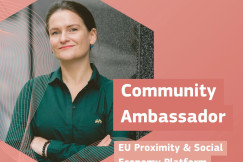Library
01 August 2025
KreNI conference in Serbia: Local innovation driving European urban transformation
Library
01 August 2025
Partnerships
Skills
Transformative Digital Transition
+19 more
Login / create an account to be able to react

Held in Niš in December 2024, the tenth KreNI conference focused on the theme of proximity, aligning with the European PSE (Proximity, Sustainability, Equity) agenda for more inclusive, accessible, and sustainable cities. The event served as a testing ground for proximity-based solutions, engaging youth, urban experts, and policymakers in co-creating locally relevant ideas. Highlights included masterclasses from leading urban thinkers, presenting successful models from cities like Vienna and projects like WOOL in Portugal, which inspired youth-led initiatives such as Take It Back, E-ride, and Ride & Revide. Organized by Young Ambassadors, KreNI also contributed to shaping EU-wide urban development discussions. More than a festival, KreNI has become a platform for youth empowerment and innovation, having supported over 50 local projects and proving that proximity can drive transformative urban change.
Young Ambassadors
Topics
EU-27
Serbia
NGOs / Non-profits
-
Thematic area
-
-
Partnerships
-
Skills
-
Transformative Digital Transition
-
Urban and Rural Wellbeing
-
-
Interlinkages with other sectors
-
-
Proximity and social economy
-
Cultural and creative industries
-
Digital
-
-
Action areas and keywords
-
-
15-minute city
-
Access to technology
-
Digital Platforms
-
Digital social innovation
-
Education
-
Innovation
-
Local employment
-
New business models
-
Smart mobility
-
-
Ecosystem focus
-
-
Proximity economy
-
Social economy
-
-
Scope of activity
-
-
International
-
Local/neighbourhood
-
National
-
Regional
-
Share
Held in Nis, Serbia in December 2024, KreNI conference marked a milestone event in southeastern Europe, aligning closely with the broader European agenda for sustainable, inclusive, and resilient cities. This tenth edition of Serbia’s leading creativity festival was built around the theme of proximity—a concept central to the PSE (Proximity, Sustainability, Equity) program, which promotes locally rooted, accessible urban development models.
PSE’s vision centers on building economically stable and socially inclusive communities where essential services—cultural, educational, health, and administrative—are reachable within a 15-minute walk or cycle. It supports cities in reducing car dependency, increasing digital accessibility, and making urban areas more livable. KreNI became a real-time testing ground for these principles, enabling youth, experts, and decision-makers to co-create solutions that reflect the needs and possibilities of the local context.
Young Ambassadors, the organization behind KreNI, plays a pivotal role in bridging grassroots action with EU-wide strategies. As an active contributor to the proximity idea, the organization works to ensure that the insights and innovations emerging from Niš are fed into European debates and urban development policies.
The highlight of KreNI was a series of Masterclasses from leading urban thinkers, each offering powerful insights into proximity-based transformation. Lara Seixo Rodrigues showcased the WOOL project in Portugal as an example of reclaiming neglected spaces through public art, inspiring projects like Take It Back, which envisions cultural regeneration in Niš’s Stara Železnička Kolonija. Damian Plant used Vienna as a benchmark for sustainable living, influencing projects such as E-ride, a unified transport app, and Green Print, which rewards eco-behavior through local incentives.
Other experts tackled proximity from varied angles. Ilhami Alkan Olsson highlighted the importance of maintaining diversity in compact neighborhoods, while Giovanni Lanza urged inclusive urban design that respects community-specific needs. Matthieu Voisin challenged participants to rethink mobility, pushing for walkable, bikeable cities that support healthy, low-carbon lifestyles. His ideas directly informed Ride & Revide, a project that combines cycling infrastructure with cultural tourism.
The outcomes of KreNI went far beyond idea generation. Winning teams received mentoring and real-world exposure—such as a study visit to Ohrid’s Startup Weekend—while the City of Niš recognized promising initiatives with awards and support for local implementation.
After ten successful editions, KreNI has grown into more than just a creativity festival. It is a platform for youth empowerment, urban experimentation, and cross-sector collaboration. With over 50 youth-led projects launched to date, it exemplifies how localized creativity can influence larger trends in urban development across Europe.
By embedding PSE principles into its structure and outcomes, KreNI demonstrated that proximity is not only a design principle—it is a pathway to more equitable, connected, and sustainable urban futures.
Documents
Comments (0)
See also
-
43
Understanding the Proximity and Social Economy Industrial Ecosystem
- Categories
- Partnerships Regenerative Green Transition Skills +65 more
-
30
Financing the Ecosystem Recap: December – January
- Categories
- Partnerships Regenerative Green Transition Skills +68 more
-
21
PSE Platform Ambassador highlight: Viktorija Bražiūnaitė, LISVA
- Categories
- Partnerships Regenerative Green Transition Skills +68 more




